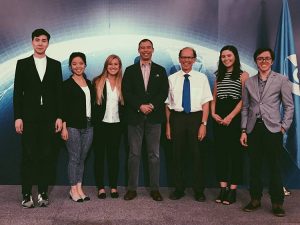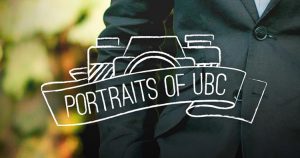Meet Cornell Yeung: From Science to Arts
After spending his first year at UBC as a Science student, Cornell Yeung quickly discovered that working in a lab was not something he wanted to pursue as a career. Frustrated with his initial experiences with academia, Cornell made a somewhat surprising and unexpected decision to leave school altogether.
After a two-year hiatus Cornell made the conscious decision to return back to school, this time as an Arts student.
Cornell lists the Arts Co-op Program as one of his main incentives for coming back to UBC. “I believed that co-op would give me opportunities to acquire practical experience and that is what I wanted to gain most out of my university degree,” he notes.
The decision to join co-op turned out to be a good one for Cornell as he went on to complete four work terms which included a communications position with Vancouver Coastal Health in addition to two international placements in Australia and Japan.
“I enjoyed the diversity of tasks my co-op positions offered me,” Cornell says, “Through my work terms, I had opportunities to work as an English Teacher in Japan, plan an awards ceremony for Vancouver Coastal Health, develop and present an anti-smoking campaign for elementary school children, work as an advisor in an Australian university, and travel.”
Reflecting on the two years he spent out of school, Cornell has no regrets. The work experience he acquired during that time contributed to helping him get into the program as well as gave him experience to offer to employers during his early search for his first co-op placement.
“Everything is a learning experience,” Cornell states, “It’s important to be open-minded when it comes to acquiring experience in both life and work.”
In describing his philosophy when it comes to planning his career, Cornell quotes Oprah, stating, “Luck is opportunity meeting preparation. When I joined the Co-op program, I didn’t know what I wanted to do as a career but I did know that I wanted to be prepared for when I did decide.”
What the Arts Co-op Program offered Cornell was the chance to explore career options. Working in a variety of fields helped him to decide what he wanted and also, what he did not want to do. The Co-op Program gave him opportunities to apply and develop his strengths, acquire transferable skills, network, and build a strong resume.
Now in his final work term, Cornell is traveling to Shanghai, China to work for a land development company.
By Carmen Chu (BA 2008, Psychology and English Literature). Carmen is an Arts Co-op student.
Meet Professor Allen Sens: Tackling the world’s problems
“Fast education is a lot like fast food,” Professor Allen Sens of Political Science analogizes. “You get it quickly, it didn’t taste like much, but it’ll do for now.”
Professor Allen Sens has spent his professional life chewing over the kind of big-world problems his students want to fix.
“Anyone can criticize,” says Sens, adopting the same dramatic, bass tone that makes him a favourite in the classroom. “You just get a soapbox, go down to Stanley Park, stand up, and start screaming. It’s a lot harder to say what you’d actually do to effect positive change.”
Sens believes a pinhole lens is inadequate for big-picture issues like global warming, sustainability, genetically modified foods, and AIDS. That’s why he is troubled that most first-year students are directed like fish into one of two streams, Arts or Science, and spend the next four, or five years narrowing in on one specific focus, never to turn back. “We can’t have a society that’s going to be capable of solving these problems without having this understanding of both the scientific basis for the problems and the social and humanities perspectives of the problems as well.”
Fusing the physical life sciences dimensions of something like climate change together with political and social aspects is the inspiration behind the Terry Project, which Sens co-coordinates with David Ng, director of the Advanced Molecular Biology Laboratory in the Michael Smith Labs. Terry brings renowned public speakers like Stephen Lewis to UBC and also publishes creative writing, mainly from undergraduates, on terry.ubc.ca, the project’s website.
This year, Sens and Ng unveiled a cross-disciplinary course they’ve been shaping, called “Global Issues in the Arts and Sciences.” “Our intent is to get students thinking in an interdisciplinary way, across Arts and Science, very early in their careers,” Sens explains. The professor has earned wide appreciation for his efforts, winning the 2003 Killam Teaching prize from fellow-faculty, plus two Just Dessert Awards, given on behalf of students by the Alma Mater Society.
Besides teaching in the Department of Political Science and being chair of the International Relations Program, Sens is probably best known for teaching “Introduction to Global Politics,” a must-take course that fills up quickly every time it is offered. “Let’s face it, content changes all the time, especially in international relations,” says Sens, referring to his own experience as a student. His PhD thesis on the possibility of a global nuclear war triggered in Europe changed “over the course of virtually an evening,” when the Cold War ended.
With this in mind, he tries to provide students with tools for lifelong learning so they can tackle those issues that frequently change in shape and size. “One of the things that troubles me about what I’ve seen particularly in recent undergraduates is they’re all in a great big rush. It’s as if our society has already imprinted onto them this image of where they need to be at a certain point in their lives, and what you need to have in order to advance, or be successful,” Sens says. “It may be more of a path to ulcers and premature graying.”
He advocates the five-year degree, and encourages students to submit their ideas to undergraduate journals, and get involved in policy debates and student governance — in other words, to allow time for thought, reflection, and analysis before graduating.
According to Sens, unless we slow down and think beyond our own personal areas of interest, we will not be equipped to address the global issues we face.
“Fast education is a lot like fast food,” he analogizes. “You get it quickly, it didn’t taste like much, but it’ll do for now. I’m a promoter of slow food and slow education. Savor it, develop the flavours, try new things, experiment.”
By Josephine Anderson, an English major at UBC.
Capturing student life through UBC Portraits
There is no question that the UBC campus is recognized for its natural aesthetic beauty and appealing locale… but what do we know about the hundreds and thousands of students that walk across campus every day? First year student Rabi Sun has captured the student life in a unique and extraordinary way through his original project called UBC Portraits.
Rabi is a first year Arts student who has taken the art of photography and applied it to his university life in a creative way. For now, he is deciding between a major in Philosophy or International Relations.
Here is Rabi’s take on his life so far as an Arts student at UBC and a bit about his love for photography:
1. It shows that photography is a big passion of yours. What is your main inspiration?
My main inspiration for photography is mainly just the idea of being to capture memories and moments in time with a still image. I am a strong believer of the phrase: “a picture is worth a thousand words”. Maybe not a thousand words, but an image is able to say a lot about something.
2. Pictures do say a lot. So I’ve taken a look at UBC Portraits and found that it is very unique and shows our university in a different light. How did you come up with this particular project?
The way the project works is a very simple idea and has been done many times in various other countries. I came across a Youtube video where two photographers in Britain spent a weekend taking 1000 photos of people of all kind in London in order to show “the true face of Britain.” After my acceptance to UBC, I figured it would be a lot easier to work on the project on campus and a good way to keep my passion for photography going.
3. Interesting, and what sort of things would you like for the visitors of the UBC Portraits blog to take away?
I don’t consider the blog to be “my blog” as it isn’t about me, but about the people who are in the photos. That being said, I would like visitors to the blog to get a sense of the diversity that there is on campus and to hopefully apply that sense of diversity to the city, the country, and even the world.
4. I agree… things happen when you least expect it and a part of life is learning how to adjust to constant changes. Is there any advice you would like to give to other aspiring photographers?
Don’t expect amazing pictures right away. If the photo is not to your standards, you’ll realize that you can take the shot again. It’s best to capture the moment rather than lose it. Photography is 20% luck, 30% vision, and 50% of just keeping an open mind.
Photo courtesy of rabi.sun

